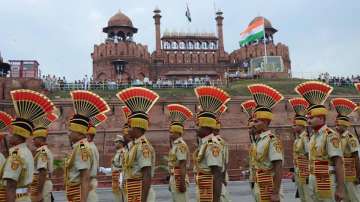On 15th August 1047, our country India became independent from the colonial rule of the Britishers after a long battle of freedom struggle. The story of the freedom movement is already known to very Indian since childhood. From people suffering to breath free air to fighters sacrificing their life for the country, the freedom movement has been an integral part of every Indian even after the country achieved liberty. Pandit Jawaharlal Nehru became the first Prime Minister of our independent India and hoisted the Indian national flag at the Lahori Gate of the Red Fort in Delhi. The moment was indeed special and his words touched every Indian. He said, “Long years ago, we made a tryst with destiny and now the time comes when we shall redeem our pledge… At the stroke of the midnight hour, when the world sleeps, India will awake to life and freedom.” His speech impacted millions of lives and contributed to the unity and power of the country.
This year, India is all set to celebrate 73rd Independence Day. During the course of freedom struggle, freedom fighters started many movements which in one way or another helped in making India a free nation. From the Indian Rebellion of 1857 to sepoy mutiny, though unsuccessful but was a major benchmark in the fight against Britishers. Let’s go down the memory lane and understand the history and Importance of celebrating Independence Day.
73rd Independence Day: History, Significance, Importance, Why it is celebrated on 15th August
15th August evokes many emotions in the hearts of India citizens. From feeling immense pride to stand today as a free nation to and acknowledging the fact that many freedom fighters sacrificed their lives during the course of the freedom movement, this day celebrates the win of every individual. There is no denying that we owe this freedom to our valiant freedom fighters who didn't hesitate for once to give up their lives, just so their future generations can breathe the free air of India.
HAPPY INDEPENDENCE DAY 2019 - HISTORY AND SIGNIFICANCE
The Indian self-rule movement was a mass-based movement that encompassed various sections of society. It also underwent a process of constant ideological evolution. Once Indians decided to be free of British Raj, the firangis had no option but to leave the country, however, it was not easy. Lord Mountbatten had been given a mandate by the British parliament to transfer the power by June 30, 1948. Watching the impatience of the people, Mountbatten knew, if he had waited till June 1948, in C Rajagopalachari’s memorable words, there would have been no power left to transfer, which is why he advanced the date to August 1947.
It was not easy for the Britishers to give up power and accept the defeat, so they camouflaged it in the name of stopping the bloodshed. Mountbatten claimed that by advancing the date, he was ensuring that there will be no bloodshed or riot. Although he was proven wrong later. He tried to justify himself saying, “wherever colonial rule has ended, there has been bloodshed. That is the price you pay.”
The Indian Independence Bill was introduced in the British House of Commons on July 4, 1947, and passed within 15 days. On August 15, 1947, the British rule over India ended and marked history.
73 years ago India’s day of pride was knocking on the door and it was the result of the efforts of millions of people.
More Bollywood stories and picture galleries
For all latest news and updates, stay tuned to our Facebook page
